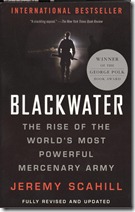By: Jeremy Scahill
I used to think that the use of mercenaries, or guns for hire, was limited to the distant past and sub-Saharan Africa. I naively expected that western democracies would not hire people who are essentially thugs with guns to do their dirty work, except perhaps in the shadowy intelligence world of black ops.
For me that all changed with the killings of four American ‘contractors’ in Faluja in March 2004. The deaths would have gone relatively unnoticed but for the way in which these men’s bodies were subsequently mutilated and put on display for the world’s television cameras. Then people started asking just who these contractors were and what they were doing in Iraq in the first place. And slowly, bit by bit, the story of Blackwater (the company for which these four men worked) started to come out.
This book covers that occurrence in detail (including Blackwater’s subsequent politically-assisted efforts to silence the families of the men killed who were seeking answers and justice). It also recounts the Nisgour Square shootings in September 2007 where a small group of Blackwater mercenaries reportedly shot and killed16 Iraqi civilians, “without provocation” according to witnesses, and “with no enemy activity involved” according to a US Army report.
This is all presented in the context of how George W. Bush’s war machine, fuelled as it was by sometimes equal portions of God, greed and gusto, lay down the welcome mat to Keith Prince’s private army and others. Prince, the founder and CEO of Blackwater, comes from a deeply religious background which opened doors to the highest levels of power within the Bush administration. And once in, Blackwater continued to work those levers of power to operate in theater with impunity, subject to neither the Uniform Code of Military Conduct (UCMJ) or the laws of Iraq, all the while fostering closer and tighter relationships through lobbying and the hiring of ex-government officials from extremely senior and sensitive positions within the administration.
At their peak, private contractors (mercenaries) actually outnumbered US military personnel on the ground in Iraq. But then, realizing the war (and its lucrative profit margins) wouldn’t go on forever, Blackwater and others set their sights on domestic markets, with Hurricane Katrina providing the impetus to deploy stateside: “[Blackwater] beat the federal government and most aid organizations to the scene as 150 heavily armed Blackwater troops dressed in full battle gear spread out into the chaos of New Orleans.” So now we have guns for hire patrolling a major US city, a law unto themselves, with no clear mandate or chain of command to a higher authority – the very definition of vigilantism.
The book is a real eye-opener, albeit a disturbing one. Recommended.
(Note to Canadian readers: Lest you think this is a US issue, news out of Ottawa today (Feb 7, 2011) claims that Canada has paid $41 million to security companies (i.e. mercenaries) in Afghanistan over the past 4 years.)

